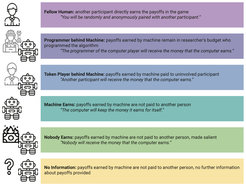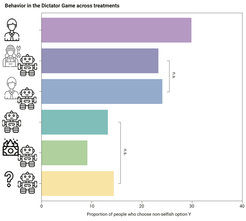Sample Project: Social Preferences Towards Machines and Humans
People’s willingness to cooperate with machines strongly depends on the way in which the payoffs for the machine are implemented.
Interest across disciplines in cooperative AI settings is growing. By now, more than 160 studies from various disciplines have studied how people cooperate with machines in behavioral experiments. Our systematic review of the instructions of these studies reveals that the implementation of the machine payoffs and the information participants receive about them differs drastically across these studies. Nevertheless, how a machine is represented likely shapes humans’ social preferences towards machines. To highlight just a few extremes: Some studies use a so-called “token player” who collects the machines’ payoffs. In other studies, participants either receive no information regarding who earns the machines’ payoffs, or they learn that these are not paid out at all.

In the Social Preferences Towards Machines and Humans project, we ran an incentivized online experiment in which we compared how the implementation of machine payoffs changes humans’ cooperation with machine partners (see Figure 1 for a complete overview).

The results suggest it makes a big difference. For instance, in the simple Dictator Game, people must decide how much money to send to their machine partners. Here, implementing a token player earning the payoff almost doubles people’s willingness to share, compared to no information (see Figure 2). In general, when matched with machine partners, people reveal substantially higher social preferences when they know that human beneficiaries receive the machine payoffs compared to when they know that no such “human behind the machine” exists. Not informing people about the machine payoffs leads to low social preferences, as people form beliefs about the payoffs in a self-favoring way. Our results thus indicate that the degree to which humans cooperate with machines depends on the implementation and information about the machine's earnings.
Scientific writings
von Schenk, A., Klockmann, V., & Köbis, N. (2022). Social preferences towards machines and humans. SSRN Pre-print. https://papers.ssrn.com/sol3/papers.cfm?abstract_id=4145868
Key references
March, C. (2021). Strategic interactions between humans and artificial intelligence: Lessons from experiments with computer players. Journal of Economic Psychology, 87, 102426.

